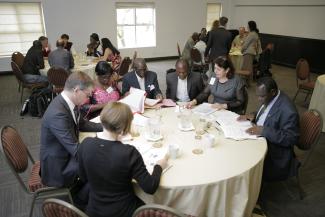Twin cities
Tackling climate issues

How did the climate-partnership project come about?
Well, it struck us in 2008 that there was no systematic way to tackle climate issues in the context of municipal partnerships. Several city administrations were running individual projects, such as donating solar cookers or organising the construction of solar panels, but we did not have a strategy that went beyond such individual measures. We decided to change that. In mid 2009, we held a federal conference of municipalities and initiatives in Munich. The conference set the goal of establishing 50 international climate partnerships by 2015. Initially, we approached local governments in Germany with twin cities in the Global South, asking them whether they'd be interested in taking part. That approach worked out well. However, we were happy to note that many municipal authorities were eager to start development cooperation in this context too. The Swabian town of Horb is an example. It is now twinned with Belo in Cameroon in a climate partnership.
Isn't climate protection uncharted territory for local policymakers?
No, it is not. We never start from scratch. German municipal governments often have very good, comprehensive approaches to climate protection, and many municipal governments in the developing world have also drafted good policies for climate mitigation and adaptation. We assess the capacities and the available data when planning partnerships diligently because we don't want to duplicate any efforts. We want to make use of what is already in place.
do your partners in the Global South really have reliable data on climate change and its impacts?
Yes, they do. In our experience, they are in many cases better prepared for action than the German partners expect. To some extent, local administrations have collected their own data. They also rely on national statistics that are of local use. Moreover, there are international reports that help to assess the impact of global warming on a particular region or town.
What exactly is a climate partnership?
When two towns agree to become twins in such a partnership, they are in for an intensive 18 months during which they set a bilateral agenda. We support them, for instance by developing capacities, by organising and funding visits, or by hosting international workshops that serve networking purposes as well as sharing experiences. We provide orientation on how to design an agenda and what kind of committees to establish. We want both sides to be engaged equally.
What items belong on a climate-partnership agenda?
Important topics include power supply, renewable energies and energy efficiency. Waste and water management are relevant too. Tanzania is a good example. Local communities in the Kilimanjaro area are affected by the dwindling of the mountain's glaciers. They are already feeling what impact climate change has on agriculture. Another recurring topic is disaster prevention. How does one respond to increasingly fierce storms? How does a coastal town adapt to the rising sea level? For these purposes, it is important to take eco systems into account. Restoring wetlands matters a lot, and so does afforestation. Another issue that always arises is awareness raising, both in Germany and in our partner countries. We need to make people understand the relevance of climate protection and the need to adapt to global warming.
What happens once an agenda is agreed?
Obviously, implementation has to come next. Work on drafting the first agendas began in 2011, and those agendas have been set by now. They define projects and spell out priorities. That is what the partners must accomplish now. We stay available for support, of course, but we are not involved as intensively anymore. A crucial thing is to access to public funding, and we can help to get it. One example was a scheme to restore a lagoon in the Ghanaian town of Cape Coast, the twin city of Bonn. The project began in 2012 and is funded by Germany's Federal Ministry for Economic Cooperation and Development (BMZ).
Is it hard to raise money from government institutions?
Well, for the German municipalities, it is an entirely new challenge. Up to a few years ago, they simply could not access Germany's international-development funding at all. Our climate partnerships have opened doors. For instance, municipal governments can now apply for money from the national Climate Facility. Bonn, together with Cape Coast, was the first town to do so, and funding was granted. In the meantime, there have been created more possibilities to obtain financial support from the BMZ for municipal governments in the context of climate partnerships. Earlier, only non-governmental organisations could apply for its funding, so many partnerships relied on NGOs. The opportunities for municipal authorities to become active have grown.
What kind of restrictions are there to municipal cooperation?
Well, it really matters what kind of jurisdictions a municipal government has. That defines what its partnership can achieve. If power supply is run by a national agency for an entire country for instance, it is difficult to start planning decentralised schemes. The German idea of statehood is different from the one prevalent in many developing countries. Germany has a long history of municipal self-administration, which is a constitutional principle. In many developing countries, however, decentralisation is a main issue, where government powers have to be transferred from the national level to subnational ones. In this context, moreover, it always matters what funds are made available to a local authority, and to what extent a municipality can generate its own revenues. Municipal governments are in a better position to act if they can raise taxes and pass their own budgets.
Stefan Wilhelmy heads ENGAGEMENT GLOBAL's Service Agency Communities in One World.
stefan.wilhelmy@engagement-global.de
www.service-eine-welt.de







